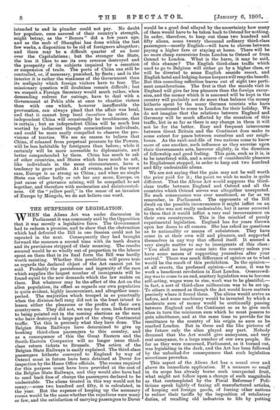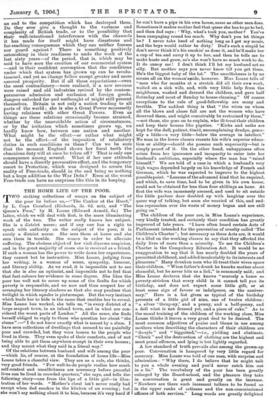THE SURPRISES OF LEGISLATION.
WHEN the Aliens Act was under discussion in Parliament it was commonly said by the Opposition that it was merely a legislative farce. The Government had to redeem a promise, and to show that the obstruction which had defeated the Bill in one Session could not be repeated in the next. Consequently they had brought forward the measure a second time with its teeth drawn and its provisions stripped of their meaning. The results secured would be so wholly out of proportion to the labour spent on them that in its final form the Bill was hardly worth resisting. Whether this prediction will prove true as regards the declared object of the Act cannot yet be said. Probably the persistence and ingenuity of the race which supplies the largest number of immigrants will be found equal to the new demands which the law makes on them. But whatever may be the effect of the Act on the alien population, its effect as regards our own population is quite evident, highly inconvenient, and altogether unex- pected. The majorities which trooped in so punctually when the division-bell rang did not in the least intend to lessen either the pleasures or the profits of their own countrymen. They did not, we may be sure, look forward to being pointed out in the coming elections as the men who have destroyed a large part of the cheap Continental traffic. Yet this is precisely what they have done. The Belgian State Railways have determined to give up booking third-class passengers to this country, and as a consequence of this the Great Eastern and. the South-Eastern Companies will no longer issue third- class return tickets to Brussels. The action of the Belgian State Railways is easily explained. The third-class passengers hitherto conveyed to England by way of Ostend must in future have been detained at Dover for inspection by the Home Office officials. The rooms required for this purpose must have been provided at the cost of the Belgian State Railways, and they would also have had to send back free of charge the passengers declared to be undesirable. The aliens treated in this way would not be inany,—some two hundred and fifty, it is calculated, in the year. But the expense of keeping up the necessary rooms would be the same whether the rejections were many or few, and the satisfaction of carrying passengers to Dover would be a good deal alloyed by the uncertainty how many of them would have to be taken back to Ostend for nothing. In order, therefore, to keep out these two hundred and fifty aliens, some twenty thousand ordinary third-class passengers—mostly English—will have to choose between paying a higher fare or staying at home. There will be no more cheap excursions from London to Ostend or from Ostend to London. What is the harm, it may be said, of this change ? The English third-class traffic which used to go to Belgium will either go by a higher class, or will be diverted to some English seaside resort, and English hotel and lodging-house keepers will reap the benefit. But this consoling reflection leaves out of sight two perti- nent considerations. The first is that the seaside visit in England will give far less pleasure than the foreign excur- sion, and the money which it is assumed will be kept in the country will probably not do more than balance the money hitherto spent by the many German tourists who have been accustomed to come to London for their holiday. We do not imagine that the relations between England and Germany will be much affected by the cessation of this traffic, but in so far as there is any change in them it will not be for the better. Easy and frequent intercourse between Great Britain and the Continent does make to some extent for peace between ourselves and our neigh- bours. As the rank-and-file of two nations come to know more of one another, such influence as they exercise upon their Governments acts, however slightly, in the direction of fellowship and good feeling. This gain, such as it is, is to be interfered with, and a source of considerable pleasure to Englishmen'. stopped, in order to keep out two hundred and fifty undesirable aliens.
We are not saying that the gain may not be well worth the price paid for it ; the point we wish to make is quite different. That the Aliens Act would suppress the third- class traffic between England and Ostend and all the countries which Ostend serves was altogether unexpected. No such consequence was ever mentioned, so far as we remember, in Parliament. The opponents of the Bill dwelt on the possible inconvenience it might inflict on an alien who was not really undesirable, but it never occurred to them that it would inflict a very real inconvenience on their own countrymen. This is the mischief of purely experimental legislation. England has for years thrown open her doors to all comers. She has asked no questions as to nationality or means of subsistence. They have come in at their own will and pleasure, and supported themselves in any way that offered itself. It seemed a very simple matter to say to immigrants of this class : "You shall no longer come into the country unless you' have some means of supporting yourselves after your arrival." There was much difference of opinion as to what , would be the result of this prohibition. In the opinion— at all events, the professed opinion—of some, it was to work a beneficent revolution in East London. Overcrowd- ing was to come to an end, sanitary legislation was to become self-acting, wages were to rise, work was to be plentiful,— iii fact, a sort of third-class millennium was to be set up. To others it seemed as though the Act would leave matters precisely where it found them. The aliens would arrive as before, and some machinery would be invented by which a moderato sum of money would be continually passing between England and the Continent so as to give each alien in turn the minimum sum which he must possess to gain admittance, and at the same time to provide for its remittance to the country of his origin as soon as he reached London. But in these and the like pictures of the future only the alien played any part. Nobody dreamed that the Act would give annoyance, and very real annoyance, to a large number of our own people. So far as they were concerned, Parliament, as it turned out, was legislating in the dark, and the Act has been followed by the unlooked-for consequences that such legislation sometimes provokes.
This aspect of the Aliens Act has a moral over and above its immediate application. If a measure so small in its scope has already borne such unexpected fruit, what might not follow upon a change of such magnitude as that contemplated by the Fiscal Reformer? Poli- ticians speak lightly of taxing all manufactured articles„ of keeping out foreign goods, of forcing other nations to reduce their tariffs by the imposition of retaliatory duties, of recalling old industries to life by putting an end to the competition which has destroyed them. Do they ever give a thought to the vastness and complexity of British trade, or to the possibility that their well-intentioned interference with the channels it luis made for itself might have disastrous and far-reaching consequences which they can neither foresee nor guard' against ? There is something positively astonishing in their readiness to undo the work of the last sixty years—of the period, that is, which may be said to have seen the creation of our commercial system —and in their confident assumption that the conditions under which that system has grown up can be revolu- tionised, and yet no change follow except greater and more assured prosperity. But if all these expectations—even the most contradictory—were realised, if a new revenue were raised and old industries revived by the contem- poraneous admission and exclusion of foreign goods, dangers unlooked for and unthought of might still present themselves. Britain is not only a nation trading to all parts of the world ; she is also a Great Power necessarily having relations with other Great Powers. Even as things are these relations occasionally become strained, whether by the unavoidable action of circumstances, or by the irritation which sometimes grows up, we hardly know how, between one nation and another. What might be the effect—or rather what might not be the effect—of the imposition of retaliatory. duties in such conditions as these ? Can we be sure that the moment England shows her fiscal teeth the obnoxious duty will at once be taken off? That is only one consequence among several. What if her new attitude should have a directly provocative effect, and the temporary resort to Protection, which was designed to secure the reality of Free-trade, should in the end bring us nothing but a huge addition to the War Debt ? Even at the worst Free-trade can have no surprises like this in its keeping.



















































 Previous page
Previous page